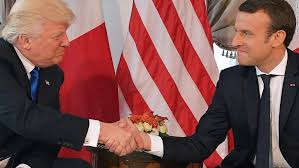Theresa May appears to have been snubbed by Donald Trump, amid reports that the White House is preparing to announce that their first guest for a state visit will be the French president, Emmanuel Macron.
Two diplomatic sources told CNN that the announcement was expected to come this week, at Davos. Neither the White House nor the Elysee would confirm the news when asked by The Telegraph.
But the news, if confirmed, is a blow to Mrs May, who was the first world leader to visit Mr Trump in the White House.
Furthermore, Mr Macron, who assumed office in May 2017, waited eight months before making his first visit to the UK last week – his predecessor, Francois Hollande, met David Cameron in the first two months.
Mrs May and Mr Trump will meet at the World Economic Forum in Davos this week.
Mr Macron invited Mr Trump to Paris for their Bastille Day celebrations, and a White House statement from when the two leaders met at the UN in September made clear the July trip had made a strong impression on the US leader.
“It was one of the greatest parades I’ve ever seen,” he said. “It was two hours on the button, and it was military might, and I think a tremendous thing for France and for the spirit of France.”
Mr Trump was so impressed that he told Mr Macron: “We’re going to have to try and top it,” adding, “we’re actually thinking about Fourth of July, Pennsylvania Avenue, having a really great parade to show our military strength.”
Mr Trump reportedly sees Mr Macron – one of few world leaders elected more recently than he was – as a fellow disruptor who is not afraid to break the mould and speak out bluntly. The two are said to have established a good working relationship, despite Mr Macron’s strong criticism of Mr Trump’s announcement in June last year that the US intended to leave the Paris Climate Agreement.
Mr Macron’s aides report in turn that he views himself as Mr Trump’s interpreter in Europe, sifting through the brash pronouncements to find places of common interest. As leaders in Berlin and London find themselves distracted by internal politics, Paris-Washington ties are enjoying renewed strength.
In addition, Mrs May’s ties to the US leader have been severely tested by Mr Trump’s twitter comments. Plans for him to visit the UK on a state visit appear to have been shelved, for now.
Mr Macron told the BBC this weekend that Mr Trump was “not a classical politician” and was “elected by his humouring people.”
He said he and Mr Trump enjoyed a “very direct relationship” and speak “very regularly.”
“I’m always extremely direct and frank,” he said. “He is. Sometimes I manage to convince him, and sometimes I fail.”
Mr Trump is the first president in almost a century not to hold a state dinner for a foreign leader in his first year in office.
A state visit with the lavish welcome ceremony and banquet is typically offered as a sign of friendship, and to showcase strategic ties between countries that are important to each other.
Mr Trump has been garlanded at state dinners held by South Korea, Vietnam and China, and welcomed with a lavish Bastille Day reception in France, yet, despite relishing the pomp and ceremony, has not reciprocated.
Sarah Huckabee Sanders, the White House press secretary, said in December there was no “singular reason” why Mr Trump has not extended a state visit invitation yet, but added that the administration hopes to schedule a visit early in 2018.
Mr Trump spoke dismissively of state dinners as a candidate, when he panned President Barack Obama’s decision to welcome Xi Jinping, the Chinese president, with a 2015 state visit.
“I would not be throwing (Xi) a dinner,” he said at the time. “I would get him a McDonald’s hamburger and say we’ve got to get down to work.”
Mr Trump has, however, met many of his foreign counterparts at the White House, sometimes over lunch, as well as abroad. He recently put the figure at more than 100.
But that is not considered comparable to a state visit.
The White House portion of the visit begins with an elaborate arrival ceremony on the South Lawn, including the pomp of a military honour guard, a troop review and leader statements. The leaders meet privately in the Oval Office before they hold a joint news conference in the East Room or the Rose Garden. The evening ends with the foreign leader as the guest of honour at a lavish state dinner attended by hundreds, including members of Congress, business leaders, celebrities, political donors and others.
The visiting leader also has lunch at the State Department, and sometimes will address a joint meeting of Congress.
Not since Calvin Coolidge in the 1920s has a president ended his first year in office without hosting a foreign leader for a state visit, according to the White House Historical Association.
Coolidge assumed office in 1923 after the sudden death of President Warren G. Harding, and was elected to a full term in 1924.
Coolidge didn’t hold a state dinner until October 1926 for Queen Marie of Romania, according to the White House association.
Every president since Coolidge has hosted at least one state visit their first year.
Lyndon Johnson held 12 in 1964, his first full year in office after President John F. Kennedy’s assassination in 1963.
Barack Obama, Trump’s immediate predecessor, held just one in 2009, for the prime minister of India — and it was famously crashed by a celebrity-seeking couple.
The Telegraph
 Lebanese Ministry of Information
Lebanese Ministry of Information



